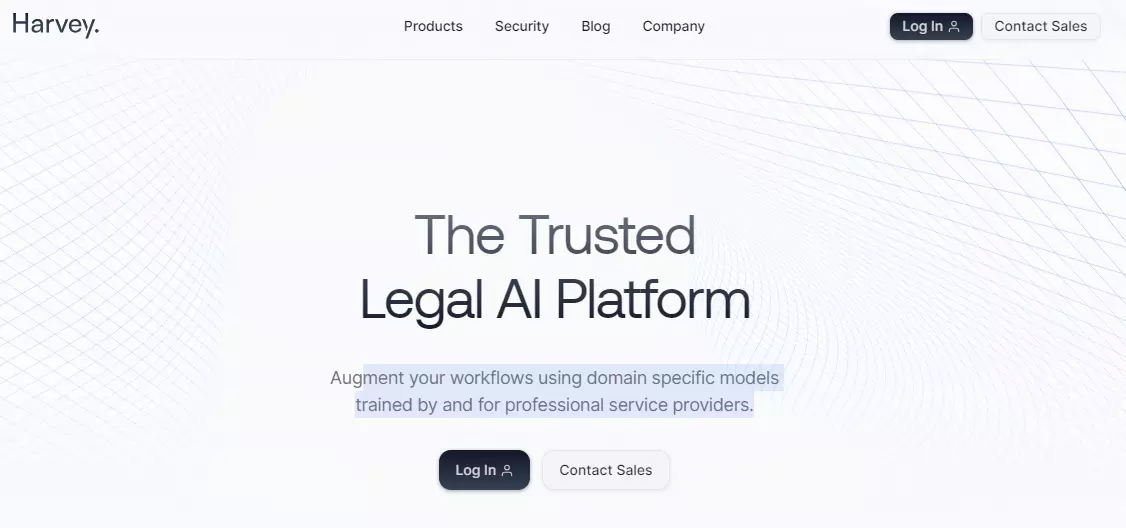
The AI startup known as Harvey, or Harvey AI, has made significant waves in the legal artificial intelligence (AI) landscape.
Given its increasing prominence, the question arises: should your law firm consider integrating this platform? Can it genuinely enhance your legal workflows and address client issues more effectively?
This article aims to address these inquiries and delve deeper into the nature of this tool. But before we proceed, let's first explore what is Harvey AI exactly.
What is Harvey AI?

Harvey AI is a specialized generative artificial intelligence platform designed specifically for legal professionals.
Diverging from other AI platforms trained on broad internet data, this startup—founded by Winston Weinberg and Gabriel Pererya—employs a vast language model enriched with legal-specific datasets and case law materials for its training.
This tailored approach enables Harvey AI to offer lawyers and attorneys the means to harness AI capabilities in their legal endeavors spanning diverse jurisdictions and practice domains.
Furthermore, users have the option to personalize their experience by training the platform with their own documents. This customization empowers them to receive tailored assistance aligned with the resources they provide.
Top Harvey AI Features
Here are just a few of the capabilities that Harvey AI brings to your law firm, ensuring the delivery of high-quality legal services to your clients at scale, while maintaining excellence for heightened client satisfaction:
1. Analysis of Legal Documents
Harvey AI offers lawyers the ability to request document reviews, identifying crucial elements and potential issues that require attention.
Drawing from either general legal data or records provided by the user, the platform identifies these elements, alleviating the need for manual review and allowing legal professionals to focus on addressing these issues directly.
2. Litigation Assistance
Harvey AI supports lawyers and attorneys by furnishing them with relevant case information gleaned from its repository of past legal precedents and case files.
By leveraging this data, it aids in the assessment of current case risks based on outcomes from similar cases in the past, empowering legal professionals to make informed decisions and enhance their chances of success.
3. Regulatory Compliance
Navigating compliance requirements and regulatory documents can be intricate, with the potential to overlook crucial regulations, leading to compliance issues.
To mitigate this risk, Harvey AI offers the capability to analyze and summarize regulatory documents, simplifying complex technical language into easily understandable content.
Furthermore, it can monitor regulatory changes, assisting your firm in staying updated and compliant, thus averting potential penalties and reputational harm.
How Macfarlanes and Other Law Firms Use Harvey AI?
In addition to Allen & Overy, several other prominent law firms are harnessing Harvey AI to enhance their legal operations. Macfarlanes LLP, another London-based firm, has integrated the platform into its workflow for document analysis and interpretation.
Furthermore, lawyers at Macfarlanes LLP utilize Harvey AI to condense presentation notes and sound bites, compose emails tailored to specific recipients, and even generate contracts.
Nixon Peabody has employed Harvey AI, particularly for timekeeping purposes, aiming to boost efficiency and ensure accurate recording of client billable hours. Meanwhile, PwC, a global network spanning 152 countries, utilizes Harvey AI to train its proprietary AI models, crafting bespoke products and professional services for internal use and commercialization to clients.
What are the Challenges that Harvey AI Faces?
Like any technological innovation, the integration of AI in the legal domain presents challenges and ethical considerations. It's imperative to address these concerns to ensure the responsible and ethical deployment of AI tools such as Harvey AI.
One primary concern revolves around the potential bias in AI algorithms. To mitigate this issue, the developers behind Harvey AI are actively engaged in creating diverse and inclusive training datasets to minimize biases and promote fair outcomes.
Moreover, legal professionals must maintain vigilance and exercise critical judgment when interpreting results generated by AI.
To counteract bias and discrimination in AI used by law firms, the following strategies can be implemented:
1. Diverse and Representative Training Data
AI algorithms should undergo training with diverse and representative datasets to prevent the perpetuation of biases. This necessitates meticulous selection of training data and ongoing monitoring to detect and address any emerging biases.
2. Algorithmic auditing and bias testing
Regular audits and bias testing are essential to identify and rectify biases within AI systems. This involves scrutinizing the impact of AI decisions across various demographic groups and implementing corrective measures as needed.
3. Continuous monitoring and improvement
AI systems should undergo continuous monitoring for biases and discrimination. Feedback loops and frequent updates can aid in enhancing the fairness and accuracy of AI algorithms over time.
4. Collaboration and training initiatives
Law firms can establish collaborative programs where AI technologies complement the work of legal professionals. Additionally, training initiatives can be rolled out to enhance the AI-related knowledge and skills of lawyers and staff.
As artificial intelligence continues to advance, Harvey AI has ample opportunity to address and overcome these challenges. Until then, the legal industry must observe how the software performs and evolves in practice.
Conclusion on Harvey AI
Harvey AI is revolutionizing the legal sector through process streamlining, efficiency enhancement, and elevated client service standards. Its sophisticated functionalities in legal research, contract analysis, and client management offer significant advantages to legal practitioners.
Nonetheless, it remains essential to maintain equilibrium between the advantages of AI and the ethical implications tied to its utilization.
As Harvey AI progresses, it stands poised to transform the landscape of legal service provision, fostering increased efficiency and accessibility within the legal profession.

